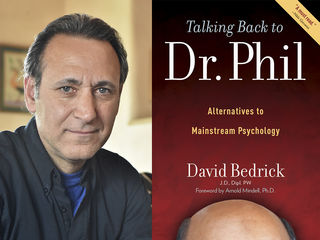Embarrassment
Understanding Shame: Symptoms and Prevention
Understanding Shame
Posted September 14, 2016
Shame can have long-term emotional effects that impede our ability to build the healthy relationship with ourselves that allows us to properly filter and respond to potentially harmful messages and behaviors. In an ideal scenario, we would be instilled from childhood with the necessary means to embrace our deepest, most whole self. However, this is a difficult feat, as society is immersed in a vicious cycle filled with spiritual and emotional disconnect as well as the transference of oppressive information and perceptions, which warrants psychological rewiring on a fundamental level.

Three Key Elements of Shame
Three important things happen to a person who's been shamed enough so that it becomes the basis for how they relate to the world and to themselves.
First, people learn to not trust themselves. Somebody has said, "Something is wrong with you." That's the message that is recorded when a person's shamed. Because they believe something’s wrong with them, their tendency is to not look inside for what's right about, and for, themselves. They’re not tuned in to their feelings, insights, or their own intelligence; instead, they look outside. Their attitude is, “Somebody tell me what's right. Something’s obviously wrong with me, so whatever I generate always feels unreliable.”
For example, let’s say you approach me and try to touch me. That might not feel comfortable to me, but since I don’t trust myself, I don’t pay attention to my natural protective instinct. I don’t believe those feelings are accurate in me.
Second, people compulsively try to fix themselves. If they believe something is wrong with them, then they’re inclined to search outside for answers to plaguing issues with self and others, through a healer, guru, teacher, friend, book, or movement—something that will take them away from who they are, that will change and fix who they are.
People try to cure themselves of themselves.
It's not that it's bad to follow teachers and healers or learn something from them. What you glean from the experience and information could be beneficial, but the sense that something is wrong with you and that you’re getting fixed keeps affirming your belief that you can’t help yourself. You never get out of it if you never find the source of your own life force and follow it.
Third, people fail to protect themselves. When something happens to them or something feels unsafe, they don't trust the feeling they have that they’re in danger. Instead, they think they’re reading the signals wrong, because their inner authority, inner compass, so to speak, is not working. They discount whatever is causing them potential harm and are therefore open to being hurt.
People get into relationships that are hurtful, over and over. Rather than saying, "This person is hurting me," they say, "Why do I do things that make people hurt me? What's wrong with me? Why do I have this pattern? Why am I so sensitive?" They don't think their partner is dangerous; they think their [perceived] inherent impairment is the reason they are suffering.
Video: Shame: Curing Oneself of Oneself
Preventing Shame
When I teach, I offer people what I believe is the number one priority, which is to rebuild and reconnect with their deepest sense of self. When people come to me, they’re often disconnected from their discernment—the part of them that indicates what's right or wrong—because shame has entered. My mission is to reconnect people with that, so that when someone does something to them, they trust what they feel, see, and know. They need to believe in their thinking and be confident that their mind is good and working well, so they don't discount their intuition. They need to trust their feelings so they don’t ignore that feeling-sense, which tells them to be more open or closed, or to move forward or back away. A person that has that connection is more impervious to influences that threaten to move them in directions that are not in their best interest.
Why Don’t People Trust Their Inner Authority?
Many of us grow up having our natural impulses run over or vilified; this may happen intermittently or continuously throughout life. If you get frightened, someone says, "Fear is not a good thing; get over your fear; let’s do something to calm your fear," as opposed to acknowledging your fear as valid. Or if you get angry, the culture itself has a large anti-anger message that says you shouldn't get angry, even though someone did something that hurt you. Anger is a natural response that society tries to discourage.
There are so many reactions we have that get discredited. For example, you may repeatedly crave something—ice cream. I say, “You shouldn't want so much ice cream; it's unhealthy.”
Instead of encouraging you to address your inner authority about the root cause of your craving, I disregard it and start to try to educate you from outside. You're no longer internally managing yourself, connecting with yourself, knowing what is right and wrong for yourself. You are being externally managed by someone. When that happens for a lifetime, from the time you were young and you were acting in certain ways that were met with disapproving comments, you begin to unzip yourself, in a way, meaning you're exposed and vulnerable to whatever messages people solicit. You get “run over” because you don't have that protective mechanism in place, and your inner relationship with yourself isn’t solid.
Healing shame requires that we connect to the truth of our own experience. We must author our own story, become our own authority.
To be clear, I am not suggesting that excessive craving for certain foods, drinks, and substances means we should indulge in all those things. They indicate our deep, unfulfilled desire for things that come up in us—a desire that needs to be investigated, not suppressed or shamed.
Consider another example—let’s say you are longing for a relationship. The message you receive from an outside source might be that you shouldn't need a relationship now; you should love yourself before you love other people. There are so many messages being forced upon us. Some of them are good for moments, but they all disconnect us from learning to connect with and follow ourselves.
Collective healing is possible, but it can only happen when people are open to the idea that they can believe in their feelings, perceptions, and impulses on a core level. Additionally, when individuals begin to release the perilous energy of dismissing and denying others’ experience, or blaming them for their reaction, and instead focus on being a healing and loving witness, there will be an influx of self-acceptance and valued connections and relationships—the resolution to some of our deepest troubles and conflicts.
**************************************************
**************************************************

You might also like: The Roots of Shame




